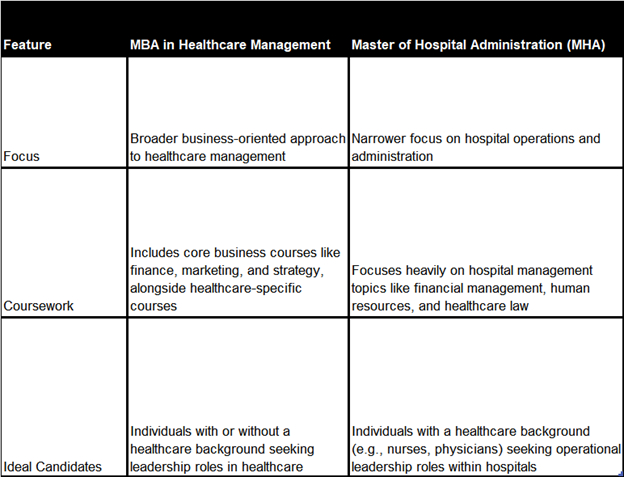
The healthcare industry is undergoing a period of immense transformation. Technological advancements like telehealth and artificial intelligence, an aging population with increasingly complex medical needs, and a growing emphasis on preventative care in a demanding environment. In this context, grabbing an MBA in Healthcare Management is a turn and a twist for triggering your career.
Join 100% online MBA Degree Program.
UGC Entitled and Affordable
Amrita AHEAD offers various MBA programs that are also equally supportive of MBA healthcare management careers which is available in online MBA programs in Amrita AHEAD.let us delve deep into the core of these MBA programs that add to healthcare management careers for a successful future that is desired field. The article will also give you a clear idea of what an MBA in Healthcare Management holds along with how well an MBA in General Management and MBA in HR can contribute to a career that is based on the Healthcare industry.
Healthcare management is the application of business principles and practices to the healthcare sector. It goes beyond simply treating patients; it’s about ensuring the efficient and effective delivery of care within a complex system. Healthcare managers wear many hats, and their responsibilities can be broadly categorized into the following areas:
An MBA in Healthcare Management opens doors to a diverse range of career opportunities for freshers. Here’s a closer look at some of the popular entry-level positions:
| Job Title | Job Role (Focus) | Est. Monthly Salary (INR) |
|---|---|---|
| Healthcare Consultant (Entry-Level) | Improve operations & efficiency | ₹42,000 – ₹58,000 |
| Healthcare Operations Manager | Department oversight (e.g., ER, Lab) | ₹38,000 – ₹54,000 |
| Health Info Mgmt Specialist | Maintain & analyze patient records (EHR) | ₹32,000 – ₹43,000 |
| Public Health Program Coordinator | Support public health initiatives (prevention, promotion) | ₹33,000 – ₹46,000 |
| Medical & Health Services Manager (Asst.) | Assist managing healthcare delivery (clinics, nursing homes) | ₹35,000 – ₹50,000 |
| Healthcare Data Analyst (Entry-Level) | Analyze data for efficiency & decision-making | ₹38,000 – ₹54,000 |
| Clinical Research Associate | Assist with clinical trials for new drugs/devices | ₹35,000 – ₹50,000 |
| Healthcare Quality Analyst | Evaluate & improve healthcare service quality | ₹33,000 – ₹48,000 |
| Healthcare Revenue Cycle Analyst | Analyze revenue data & ensure timely payments | ₹38,000 – ₹52,000 |
| Healthcare Project Manager | Manage healthcare projects (e.g., new technology) | ₹42,000 – ₹58,000 |
| Medical Sales Representative | Sell medical devices/pharmaceuticals to healthcare providers | ₹40,000 – ₹62,000 |
The average starting MBA salary for Healthcare Management graduate in India can vary depending on several factors. These include location, the specific job role, the reputation of the hiring organisation, and the candidate’s prior experience. However, based on job market trends, it typically falls within the range of INR 5 lakhs to INR 8 lakhs per annum ([Source]). This is a competitive starting MBA salary, and with experience and acquiring leadership positions, salaries can significantly increase.
An Online MBA in Healthcare Management equips you with business acumen to excel in the dynamic healthcare field, all from the comfort of your own schedule. Leverage the flexibility of an Online MBA in Healthcare Management to gain the skills and knowledge to become a leader in the ever-evolving healthcare industry. Pursue your passion for healthcare leadership with an Online MBA in Healthcare Management – a convenient and valuable pathway to a fulfilling career. Here are some online MBA in Healthcare Management Benefits
While an MBA in Healthcare Management offers a broader business-oriented approach, a BBA in Hospital Management can also be a stepping stone to a career in healthcare management. However, the starting MBA salary for a BBA graduate may be slightly lower than that of an MBA graduate, typically ranging from INR 3 lakhs to INR 5 lakhs per annum This is because a BBA program focuses more on the operational aspects of hospital management, while an MBA equips graduates with a broader range of business skills, including finance, marketing, strategy, and leadership. An MBA graduate will be more competitive for leadership roles and higher-paying positions within the healthcare sector.
Yes, you absolutely can pursue an MBA in Healthcare Management after completing a BSc in Nursing. In fact, your background in patient care can be a valuable asset. Nurses have a deep understanding of patient needs and the complexities of the healthcare delivery system. This firsthand experience, combined with the business acumen gained through an MBA, positions you uniquely to contribute to the management and improvement of healthcare systems.
Many universities recognize the value of a nursing background and offer specialized MBA programs designed for healthcare professionals. These online MBAprograms as well as offline MBA programs often consider relevant work experience in place of the traditional GMAT requirement, making it easier for nurses to transition into leadership roles within healthcare management.
A Master of Hospital Administration (MHA) is another excellent postgraduate degree option for individuals seeking MBA career oppurtunities in healthcare management. The MHA program has a narrower focus compared to the MBA in Healthcare Management. It delves deeper into the specific aspects of hospital operations, such as financial management, human resource management, and healthcare law. This makes MHA graduates well-equipped to handle administrative and operational leadership roles within hospitals and healthcare systems.
Here’s a table Summarizing the key differences between an MBA in Healthcare Management and an MHA:

Ultimately, the choice between an MBA in Healthcare Management and an MHA depends on your career goals and interests. If you are interested in a broader range of leadership MBA career opportunities within the healthcare sector, an MBA might be a better fit. If you are specifically interested in hospital administration and operations, an MHA Program could be the ideal choice.
an MBA in Healthcare Management equips you with the skills and knowledge to navigate the complexities of the healthcare industry and make a positive impact. From patient care to policy development, the MBA career opportunities in healthcare management in this field are vast and rewarding. If you are passionate about healthcare and possess a strong business acumen, then an MBA in Healthcare Management can be the perfect stepping stone to a fulfilling and lucrative MBA career opportunities in healthcare management.